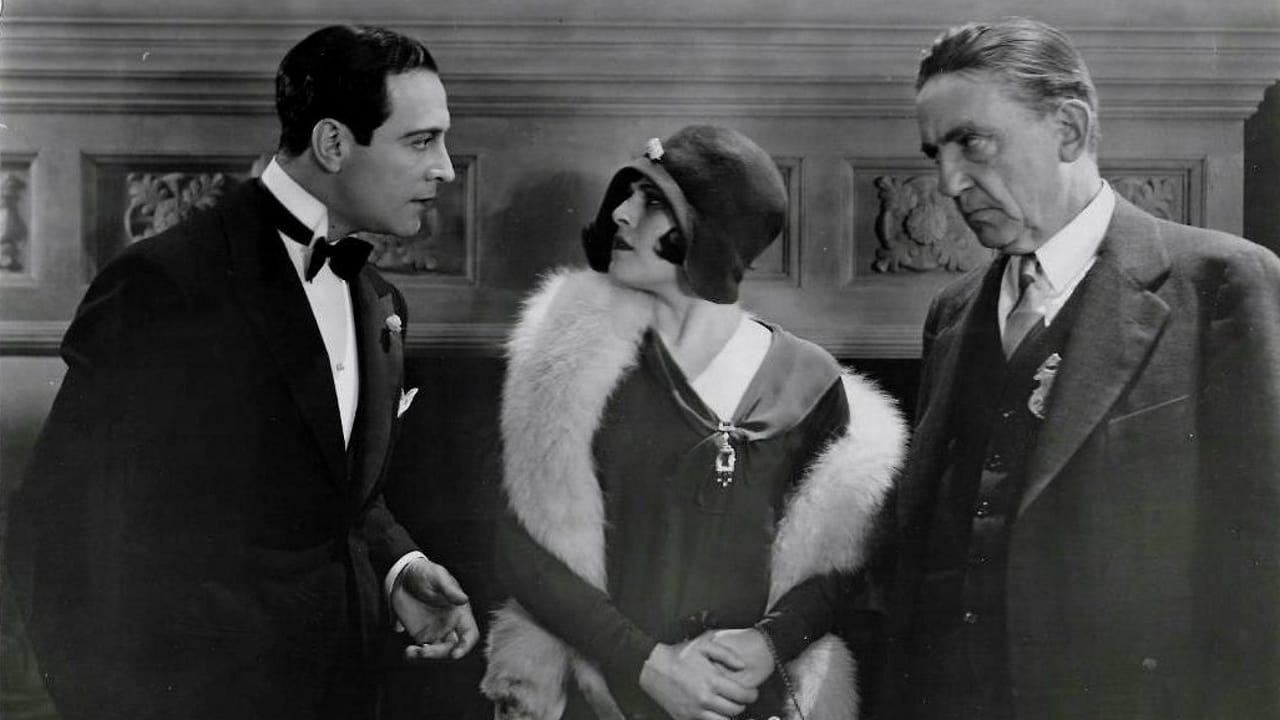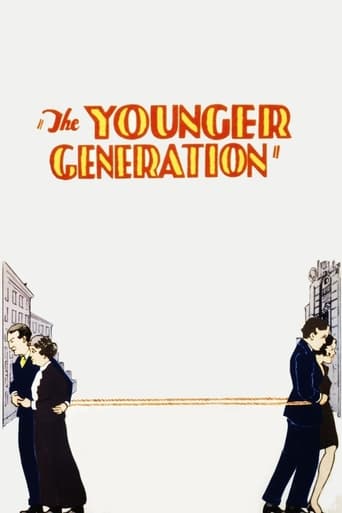

THE YOUNGER GENERATION (1929) starts as a silent film, complete with synchronized audio track (for music and sound effects), but eventually lapses into an early talkie with spoken dialogue. The scenes alternate between silent and sound throughout the duration of the film. It's an interesting curiosity for film history buffs, as the movie was released at seemingly the exact moment when Hollywood transitioned from silent cinema to talking pictures.The story is nothing groundbreaking. The Goldfish family rises from the cultural melting pot of the Lower East Side to Fifth Avenue high society, thanks to son Morris (Ricardo Cortez), a shrewd businessman who grows the family furniture store into a successful antiques emporium.Morris rules his family with an iron fist, forbidding his sister Birdie (Lina Basquette) from seeing her childhood sweetheart from the old neighborhood. The ritzy Fifth Avenue lifestyle stifles Papa Goldfish (Jean Hersholt), who misses his friends from Delancey Street. Morris even legally changes his surname from Goldfish to the less-Jewish "Fish" in order to distance himself from his family's ethnic heritage.As an early talkie, many of the line readings are a bit awkward, though Basquette handles the dialogue better than the rest of the cast (even Cortez). But even with her naturalistic delivery, the lines are often written awkwardly.Still, the human drama pulls at your heart. Financial success brings misery to the Goldfish family. Morris is a real jerk, and everyone else in his house suffers as he climbs the social ladder. Cut off from her family, Birdie stitches together a happy little life with her songwriter husband, while Morris obsesses over his social position and leads an ultimately empty existence. Lina Basquette is pretty cute as Birdie and Jean Hersholt's performance is heartbreaking.
... View MoreThe plot line of immigrant children rejecting their culture to try to get ahead in the "new world" was quite common in the early 30s ("Unashamed" (1932), "Forgotten" (1933)) but almost disappeared with the introduction of the production code. Movie moguls (most of whom were Jewish) wanted to prove that they were "loyal Americans" and to squash what they felt was Jewish clannishness. Even Ricardo Cortez wasn't really Ricardo Cortez but Jacob Kranz, son of a New York Jewish butcher. He had been discovered for movies in the mid 1920s and given a more romantic sounding name in a bid to be a successor to Rudolph Valentino. This particular film plot sounds suspiciously like Universal's "His People" of 1925, complete with a scene in which the upwardly mobile lawyer son denies his parents at a party!!Morris is the light of his mother's life but he is also a little tyrant and when Eddie (Leon Janney) sees him bullying his sister, Birdie, he crawls across from his tenement and they have a fight, which causes a fire. This results in their flat being guttered but resourceful Morris declares that with the items he saved they can now have a fire sale. Mama is proud but Papa (Jean Hersholt) philosopically declares that money can't but happiness.As the years go by, thanks to Morris's shrewdness, the family fortunes rise from second hand dealers to a 5th Avenue antique store - although Papa can't forget the happiness of those "street corner days" with himself and his old cronies. Wealth has not made him happy, even the butler doesn't laugh at his jokes. Birdie feels the same and has carried on her friendship with Eddie (Rex Lease).A "talkie sequence" follows, when Morris (Ricardo Cortez) says he has changed his name from Goldfish to Fish. "Goldfish is dead - long live Mr. Fish"!! Birdie declares. There is also a confrontation between Morris and Eddie when he comes to call. This sequence shows that all the leads had nothing to fear from the "talkies" - all of them spoke clearly but it did slow the film down somewhat. Eddie is desperate to get some money to marry Birdie and falls in, unknowingly, with a gang of crooks who want him to plug songs in front of a jewellers - while they rob it!!! With all this happening, Morris feels he has been disgraced socially - yes, it's all about him!! and he throws Birdie out - unbeknownst to Papa, who spends the next two years in a depressed state. Morris sees to it that he receives none of Birdie's desperate letters.Even though Eddie is in jail, things are looking up. Birdie, who now has a baby boy, has sold one of Eddie's songs for $1,000!! After denying his parents (in a very poignant part, when they come home from celebrating becoming grandparents, he purposely mistakes them for servants) you know it is not going to end happily for Morris. At the end, even Morris's biggest champion, Mama, knows she will be happier living with Birdie and Eddie who, even though they have come up in the world, have never forgotten who they are - maybe Morris, who sits empty and alone, huddling in one of mama's blankets, may soon remember as well.Lina Basquette was just terrific in this movie, as was Jean Hersholt. I found her a lot more believable in this one than "The Godless Girl". She was one star who really improved with talking pictures. 1929 should have been her year as she was in two very fine films but "The Godless Girl", even though a Cecil B. DeMille production was a silent and "The Younger Generation" was a silent with talking sequences. Very unusual in 1929 when silent movies were almost a thing of the past.
... View MoreYounger Generation, The (1929)** 1/2 (out of 4)Early Capra melodrama has poor Jewish family taken out of the ghetto by their youngest son (Ricardo Cortez) who strikes it big. He moves his father (Jean Hersholt), mother (Rosa Rosanova) and sister (Lina Basquette) into a large house and expects them to do what he says and stay away from the "filth" they grew up around. Soon the three start to realize that money can't buy happiness but will the son learn this before it's too late? At this point in time Columbia was still a very small studio so they couldn't afford to go all in in terms of sound movies so this is another example of a silent with a few sound segments scattered throughout the film. I've always found this to be incredibly distracting but I think Capra does a great job at when to use the sound and I also think the quality of the recorded words is among the best I've heard from this era. Considering how poor the studio was it's rather shocking that some of the other studios early talkies didn't come off sounding better. With that said, there are some major problems with the film but for the most part it's a nice time filler that fans of the director will want to check out. The biggest problem is that even in 1929 this material was way too predictable. There's really not a single thing that happens in the film that you won't see coming from a mile away. The format pretty much follows every morality film that came before it and I just wish at some point Capra would have shaken things up just to keep us off guard or at least in some drama. It should come as no shock that Capra does a great job with what's here and manages to keep the film moving quite fast and he keeps it as entertaining as the screenplay will allow. The cast also keeps things moving nicely with their fine performances. Cortez would play this type of role countless times in his career and he always managed to do good with it. Hersholt clearly steals the film as the tortured father. In the end, this isn't the greatest film ever made but I think Capra did the most he could considering what he had to work with. I think those who like to search out these early talkies will find the quality here to be above average and will make one wonder why some of the bigger studios didn't have their stuff sounding as good.
... View MoreIn this film, we see Morris Goldfish (Ricardo Cortez) bring success to his Jewish family, first as a young newspaper boy in New York City, and later a very successful, ambitious businessman. His mother (Rosa Rosanova) sees his skills, and encourages him, but the father and sister miss their old ramshackle home and old friends on the lower east side. This is one of the crossover films, where the soundtrack technology was invented while the film was being made. About halfway through the film, it switches from a silent film with title cards into a talking picture with sound track. Then it goes back to using title cards until the very end, with the final scene using sound again. Most of the cast had been making silent films for years, so they probably had to adjust to the sound portions. Good job by most of the cast. Papa Goldfish (Jean Hersholt) spends most of the film lamenting their new high-society lifestyle, and it gets annoying after a while. He won't even be happy when one of his kids gets engaged and married. We watch as Morris gets more and more successful, and he treats his own family very badly. Most of the story is told in dialogue, and after the big, grand opening, it looks like the rest was filmed in one room. This came out just before the big money crash of 1929, so we can assume that Morris will get what he deserves later, even if this story ends mostly on a sad note.
... View More